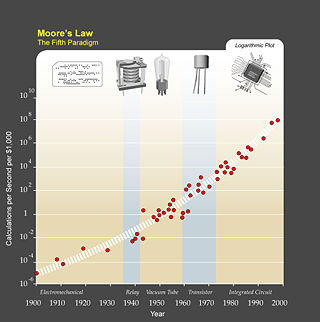Related Research Articles

Urbanization is the population shift from rural to urban areas, the corresponding decrease in the proportion of people living in rural areas, and the ways in which societies adapt to this change. It can also mean population growth in urban areas instead of rural ones. It is predominantly the process by which towns and cities are formed and become larger as more people begin living and working in central areas.

S&P Global Inc. is an American publicly traded corporation headquartered in Manhattan, New York City. Its primary areas of business are financial information and analytics. It is the parent company of S&P Global Ratings, S&P Global Market Intelligence, S&P Global Mobility, S&P Global Engineering Solutions, S&P Global Sustainable1, and S&P Global Commodity Insights, CRISIL, and is the majority owner of the S&P Dow Jones Indices joint venture. "S&P" is a shortening of "Standard and Poor's".

Government spending or expenditure includes all government consumption, investment, and transfer payments. In national income accounting, the acquisition by governments of goods and services for current use, to directly satisfy the individual or collective needs of the community, is classed as government final consumption expenditure. Government acquisition of goods and services intended to create future benefits, such as infrastructure investment or research spending, is classed as government investment. These two types of government spending, on final consumption and on gross capital formation, together constitute one of the major components of gross domestic product.

Daniel Howard Yergin is an American author and consultant within the energy and economic sectors. Yergin is vice chairman of S&P Global. He was formerly vice chairman of IHS Markit, which merged with S&P in 2022. He founded Cambridge Energy Research Associates, which IHS Markit acquired in 2004. He has authored or co-authored several books on energy and world economics, including the Pulitzer Prize–winning The Prize: The Epic Quest for Oil, Money, and Power, (1991) The Quest: Energy, Security, and the Remaking of the Modern World (2011), and The New Map: Energy, Climate, and the Clash of Nations (2020).

Futures studies, futures research, futurism research, futurism, or futurology is the systematic, interdisciplinary and holistic study of social/technological advancement, and other environmental trends; often for the purpose of exploring how people will live and work in the future. Predictive techniques, such as forecasting, can be applied, but contemporary futures studies scholars emphasize the importance of systematically exploring alternatives. In general, it can be considered as a branch of the social sciences and an extension to the field of history. Futures studies seeks to understand what is likely to continue and what could plausibly change. Part of the discipline thus seeks a systematic and pattern-based understanding of past and present, and to explore the possibility of future events and trends.
S&P Global Commodity Insights is a provider of energy and commodities information and a source of benchmark price assessments in the physical commodity markets. The business was started with the foundation in 1909 of the magazine National Petroleum News by Warren C. Platt.
John Naisbitt was an American author and public speaker in the area of futures studies. His first book Megatrends: Ten New Directions Transforming Our Lives was published in 1982. It was the result of almost ten years of research. It was on The New York Times Best Seller list for two years, mostly as No. 1. Megatrends was published in 57 countries and sold more than 14 million copies.

Purchasing managers' indexes (PMI) are economic indicators derived from monthly surveys of private sector companies.

Megatrend University is a private university located in New Belgrade, the city of Belgrade, Serbia. It was founded in 1989 as the Megatrend Business School, which later became Megatrend University.
Nariman Behravesh is Chief Economist at the consulting firm IHS Markit, and author of Spin-Free Economics: A No-Nonsense, Nonpartisan Guide to Today's Global Economic Debates.
Markit Ltd. was a British financial information and services company with over 4,000 employees, founded in 2003 as an independent source of credit derivative pricing. The company provides independent data, trade processing of derivatives, foreign exchange and loans, customised technology platforms and managed services. The company aims to enhance transparency, reduce financial risk and improve operational efficiency. Its client base includes institutional participants in the financial marketplace. On 12 July 2016, Markit and IHS Inc. merged in an all-stock merger of equals to form IHS Markit. IHS Markit later merged with S&P Global on 28 February 2022.
An academic discipline or academic field is a subdivision of knowledge that is taught and researched at the college or university level. Disciplines are defined and recognized by the academic journals in which research is published, and the learned societies and academic departments or faculties within colleges and universities to which their practitioners belong. Academic disciplines are conventionally divided into the humanities, the scientific disciplines, the formal sciences like mathematics and computer science; the social sciences are sometimes considered a fourth category.
In communication, media are the outlets or tools used to store and deliver semantic information or contained subject matter, described as content. The term generally refers to components of the mass media communications industry, such as print media (publishing), news media, photography, cinema, broadcasting, digital media, and advertising. Each of these different channels requires a specific, thus media-adequate approach, to a successful transmission of content.
IHS Markit Ltd was an information services provider that completed a merger with S&P Global in 2022. Headquartered in London, it was formed in 2016 with the merger of IHS Inc. and Markit Ltd.

The 2018 Agenda for Sustainable Development, adopted by all United Nations members in 2015, created 17 world Sustainable Development Goals (SDGs). They were created with the aim of "peace and prosperity for people and the planet..." – while tackling climate change and working to preserve oceans and forests. The SDGs highlight the connections between the environmental, social and economic aspects of sustainable development. Sustainability is at the center of the SDGs.

Douglas L. Peterson is the president and chief executive officer of S&P Global, formerly McGraw Hill Financial. He became president and chief executive officer in November 2013. Peterson has served on S&P Global’s Board of Directors since July 2013. In June 2024, Peterson announced his plans to retire from the position of CEO and step down, with S&P Global Ratings President Martina Cheung replacing him. Doug originally joined the company as president of Standard & Poor's Ratings Services in 2011.
CERAWeek is an annual energy conference organized by the information and insights company S&P Global in Houston, Texas. The conference provides a platform for discussion on a range of energy-related topics; CERAWeek 2019 featured sessions on the world economic outlook, geopolitics, energy policy and regulation, climate change and technological innovation, among other topics. The conference features prominent speakers from energy, policy, technology, and financial industries, and is chaired by Pulitzer Prize winner Daniel Yergin, vice-chairman, IHS Markit and Jamey Rosenfield, vice chair, CERAWeek, senior vice president, IHS Markit. Both are co-founders of Cambridge Energy Research Associates.
NewsBank Inc. is a US-based commercial company founded in 1972 that operates a global news database resource providing online archives of media publications as reference materials to libraries. As of 2024 it includes current and archived information from thousands of newspapers, videos, broadcast transcripts, journals, and other publications.
Trackinsight is a financial technology company headquartered in Biot, France. The company offers global Exchange-traded Fund (ETF) data and selection services for professional investors, advisors, institutions and ETF industry participants.
Thematic investing is a form of investment that aims to identify macro-level trends and the underlying investments that stand to benefit from the materialisation of those trends. Thematic investing aims to seize opportunities arising from megatrends likely to shape the global economy in the decades ahead.
References
- ↑ "Five of the world's biggest environmental problems - 11.10.2016". DW.COM. Retrieved July 27, 2020.
- ↑ "AlternAtive Worlds" (PDF). Office of the Director of National Intelligence.
- 1 2 Kuhn, Subin (2022-05-17). Global Perspectives on Megatrends. doi:10.24216/9783838215631. ISBN 978-3-8382-7563-5 . Retrieved 2024-10-07.
- ↑ Naisbitt, John (1982). Megatrends: ten new directions transforming our lives. New York: Warner Books. ISBN 978-0-446-51251-0.
- ↑ "Invest in the future with megatrends - BlackRock". BlackRock. December 31, 2019. Retrieved July 27, 2020.
- ↑ PricewaterhouseCoopers (November 22, 2016). "Five Megatrends And Their Implications for Global Defense & Security". PwC. Retrieved July 27, 2020. pdf
- 1 2 3 Ernst & Young (June 19, 2020). "Are you reframing your future or is the future reframing you?". EY. Retrieved August 23, 2020. pdf
- ↑ "Number of Connected IoT Devices Will Surge to 125 Billion by 2030, IHS Markit Says". IHS Markit Online Newsroom. October 24, 2017. Retrieved July 27, 2020.
- ↑ "World Population Prospects: The 2017 Revision - Multimedia Library". United Nations Department of Economic and Social Affairs. June 21, 2017. Retrieved July 27, 2020.
- ↑ "World Urbanization Prospects - United Nations". Population Division. May 16, 2018. Retrieved July 27, 2020.
- ↑ "New Energy Outlook" (PDF). Bloomberg. 2017.
- ↑ "The Long View How will the global economic order change by 2050" (PDF). PWC. 2017.